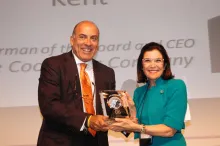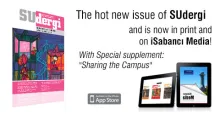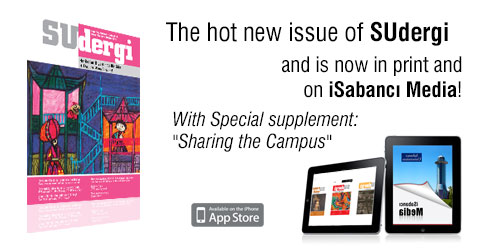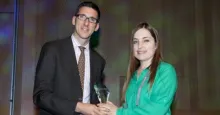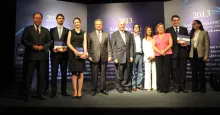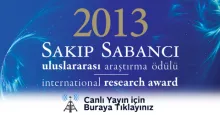Güler Sabancı Speaks at the Sabancı University Commencement Ceremony

Speech of Sabancı University Board of Trustees Chair Güler Sabancı
On behalf of the Sabancı University Board of Trustees, I would like to welcome all of you to our commencement ceremony. We will be seeing off our 14th undergraduate and 11th graduate classes this year.
When I arrived at the campus today, I remembered that day in 1997 when the foundation for our university was laid. This was a deforested land surrounded by shanties, and there was a stone quarry in it. There were a few weak saplings and bushes here and there, and a pit where our lake is today. We planted almost 150,000 trees and flowers. We decorated the land with half a million seasonal shrubs. The blighted land turned into an oasis where pines, cedars, maples, cherries and plums grow. We irrigate this land with the water from the lake, where we collect treated wastewater.
Many people have put effort into this. First and foremost we must remember the late Sakıp Sabancı, who attended all our planting ceremonies with joy. I must also thank our founding president Tosun Terzioğlu as well as Nermin Tirben and the Kartepe Peyzaj team, who have been taking care of our landscaping since our establishment.
Feeling the energy of the youth here and getting to know our highly knowledgeable graduates who will be the leaders of the future, our hopes for tomorrow soar. Considering what we have been living through in the past few weeks, we can now appreciate how much we need the youth to look at the future with high expectations. We know that violence, separation and opposing extremes can never be the solution. We believe in reason, common sense, understanding and our bright youth for the future of our country, and will continue to do so.
With you, we now have more than 6000 alumni who are influential leaders both in business and in academia. They are working to create value all around the world. Many of our own alumni join us here at the university in administrative and academic positions, and their numbers are rising every year.
As Sabancı University, we have striven to fulfill our responsibilities towards our students and their parents, our employees, administrators and the entire society. We work diligently to ensure that you are well-prepared to surpass the day and age in which we live, and continue to develop in the process.
The philosophy of our university means that students respect free thought, have unprejudiced minds that are open to different opinions, celebrate the richness brought by diversity, and value the strength of knowledge. I am sure that our graduates today will continue to make a difference with their learnings everywhere they go.
The university has developed significantly since its establishment, and this corresponds to a great leap in our country. We have made many reforms in preparing for the EU. Our economy is among the greatest of the world and the per capita income exceeded 10,000 dollars. Villages without power, water or roads are a thing of the past. Our industry works at international standards, our finance sector is sound and our entrepreneurs cherish technology and development. However, Global markets and the world in general sail through turbulent waters. While we have become used to extreme liquidity in markets during the crisis period, this will now begin to wane, starting with the United States. This will impact emerging countries like Turkey, where natural resources are limited. Therefore, we will need more confidence and stability than ever in the years to come. Under these circumstances, it is now even more important that the process for peace and brotherhood continues smoothly. We need a democratic Constitution that recognizes freedoms and the rule of law in order to achieve Atatürk’s goal of a modern civilization.
As a university that leads the time rather than follow it, Sabancı University chose to create a new and unique model instead of repeating old models.
Looking at what we do and what we have achieved today, you will see that the steps we took were on the path that we so successfully chose in the beginning: a path towards being unique and open to change, doing the undone, creating and developing together.
I would thus like to reiterate the objectives of our university:
• To become an effective and successful center of excellence in nanotechnology research and application;
• To expand and deepen research on global issues such as climate and energy;
• To cooperate with international research institutions and reputable universities;
• To increase the number of international faculty and students.
These objectives are the requirements of our long-term vision of becoming a “global university” – one that we established in the beginning. As the Board of Trustees, we will continue to work towards these objectives under the guidance of our President, Nihat Berker.
We had a tremendous achievement last year. Working towards making Turkey a technology hub, Sabancı University ranked first in the “Most Innovative and Entrepreneurial Universities Index” compiled for the first time in 2012 by the Ministry of Industry through an assessment of all universities in Turkey.
As always, we are proud to be pioneers. Our university raises the standards of higher education in Turkey with its faculty, philosophy of education, academic background and technology.
Turkey will need to produce technology and brands in order to make another leap in the future. This is why I would now like to applaud our faculty members, because they embrace and cultivate innovation, push the boundaries with their research, and continue their dedicated work for Turkey’s future.
Some things happen only once in life, like your commencement today. You are now commencing a new part of your life towards a bright future. Do not lose your ability to look at things in a positive, constructive light. Know yourself well. Keep yourselves open to research, learning and continuous development. Believe in the power of knowledge. You are bright, young people; never lose that light. Be different. Be good and nice people. Try to make an art and a sport a part of your daily life. Remember that, during the worst days of the Second World War, Churchill would take care to paint for at least an hour every day.
Being open to change is a sign of self-esteem and self-respect. Not everyone may be up to questioning the establishment or “teaching an old dog new tricks.” This takes profound knowledge, imagination, persuasion, integrity. Defend and live the change which you believe to be right with courage. Always have the heart to try your hand at a new and different subject. The courage to change is what makes a human, says Oscar Wilde. Your courage to change and progress will spring from the skills and knowledge you gain.
A new part of your life begins today, but you will continue to learn, progress, stumble from time to time, and have successes and failures, just like you had been here. You may have to make conflicting decisions. When faced with difficult choices, your only guidance will be universal values. Your tenets should be human rights, gender equality, freedom of thought, rule of law and respect for individuals. They will be the stars that light your path.
As I take part in your joy today, I must remember and thank some people:
• I thank the Sabancı Family and Sabancı Foundation for their unwavering support since the foundation of the university.
• I am eternally grateful to Sakıp Sabancı for the endowment fund he created, for his positive personality and dedicated efforts to make our university a reality.
• Our parents deserve thanks for their dedication and sacrifice.
• President Nihat Berker and all members of our faculty have done their best to shape you into individuals that are involved in your environment and communities. I must thank them for a youth that possesses free thought, free consciences and free wisdom.
• My special gratitude to Secretary-General Haluk Bal and all our administrative personnel;
• Members of the Board of Trustees for their support;
• And Ayhan Sicimoğlu and his friends, who have been making our commencement ceremonies unforgettable for years.
• Finally, I would like to thank Yekta Kara for the organization of this ceremony as in previous years.
You will always be our pride. Sabancı University will always be with you. But you should remember your university too.


